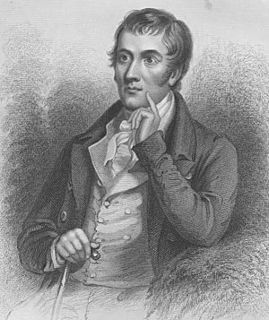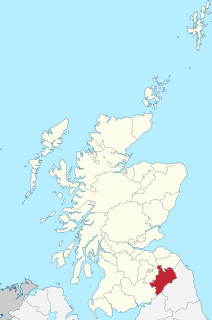Related Research Articles

A Burns supper is a celebration of the life and poetry of the poet Robert Burns, the author of many Scots poems. The suppers are normally held on or near the poet's birthday, 25 January, known as Burns Night. However, in principle, celebrations may be held at any other time of the year. Burns suppers are held all around the world.

James Hogg was a Scottish poet, novelist and essayist who wrote in both Scots and English. As a young man he worked as a shepherd and farmhand, and was largely self-educated through reading. He was a friend of many of the great writers of his day, including Sir Walter Scott, of whom he later wrote an unauthorised biography. He became widely known as the "Ettrick Shepherd", a nickname under which some of his works were published, and the character name he was given in the widely read series Noctes Ambrosianae, published in Blackwood's Magazine. He is best known today for his novel The Private Memoirs and Confessions of a Justified Sinner. His other works include the long poem The Queen's Wake (1813), his collection of songs Jacobite Relics (1819), and his two novels The Three Perils of Man (1822), and The Three Perils of Woman (1823).

Robert Tannahill was a Scottish poet of labouring class origin. Known as the 'Weaver Poet', he wrote poetry in English and lyrics in Scots in the wake of Robert Burns.

Roxburghshire or the County of Roxburgh is a historic county and registration county in the Southern Uplands of Scotland. It borders Dumfriesshire to the west, Selkirkshire and Midlothian to the north-west, and Berwickshire to the north. To the south-west it borders Cumberland and to the south-east Northumberland, both in England.

John Shaw Neilson was an Australian poet. Slightly built, for most of his life he worked as a labourer, fruit-picking, clearing scrub, navvying and working in quarries, and, after 1928, working as a messenger with the Country Roads Board in Melbourne. Largely untrained and only basically educated, Neilson became known as one of Australia's finest lyric poets, who wrote a great deal about the natural world, and the beauty in it.

Isabel Pagan, also known as "Tibbie", was a Scottish poet of the Romantic Era.

Morebattle is a village in the Scottish Borders area of Scotland, on the B6401, seven miles south of Kelso, Scottish Borders, beside the Kale Water, a tributary of the River Teviot. The St. Cuthbert's Way long distance footpath passes through the village.

"Tam o' Shanter" is a narrative poem written by the Scottish poet Robert Burns in 1790, while living in Dumfries. First published in 1791, at 228 lines it is one of Burns' longer poems, and employs a mixture of Scots and English.

Cotter, cottier, cottar, Kosatter or Kötter is the German or Scots term for a peasant farmer. Cotters occupied cottages and cultivated small land lots. The word cotter is often employed to translate the cotarius recorded in the Domesday Book, a social class whose exact status has been the subject of some discussion among historians, and is still a matter of doubt. According to Domesday, the cotarii were comparatively few, numbering fewer than seven thousand people. They were scattered unevenly throughout England, located principally in the counties of Southern England. They either cultivated a small plot of land or worked on the holdings of the villani. Like the villani, among whom they were frequently classed, their economic condition may be described as free in relation to everyone except their lord.

Agnes Broun, Agnes Brown or Agnes Burnes, was the mother of Scotland's national poet, Robert Burns. Agnes's father, Gilbert (1708–1774), was the tenant of the 300-acre (120 ha) farm of Craigenton, in Kirkoswald parish, South Ayrshire, Scotland.

Henry Scott Riddell was a Scottish poet and songwriter. In the Scottish Orpheus, a collection of songs of Scotland by Adam Hamilton, he is credited with writing Scotland Yet and The Dowie Dens O' Yarrow.
Nationality words link to articles with information on the nation's poetry or literature.
Nationality words link to articles with information on the nation's poetry or literature.
John Struthers was a Scottish poet and miscellaneous writer.
Maxton is a hamlet and civil parish in Roxburghshire, Scotland, and part of the Scottish Borders region.

Robert Burns, also known familiarly as Rabbie Burns, was a Scottish poet and lyricist. He is widely regarded as the national poet of Scotland and is celebrated worldwide. He is the best known of the poets who have written in the Scots language, although much of his writing is in a "light Scots dialect" of English, accessible to an audience beyond Scotland. He also wrote in standard English, and in these writings his political or civil commentary is often at its bluntest.
Events from the year 1855 in Scotland.
Events from the year 1848 in Scotland.
Events from the year 1757 in Scotland.
Alexander Bethune (1804–1843) was a short-lived Scottish weaver-poet. Twice crippled by explosions, he was said to be very disfigured and looked "prematurely aged".